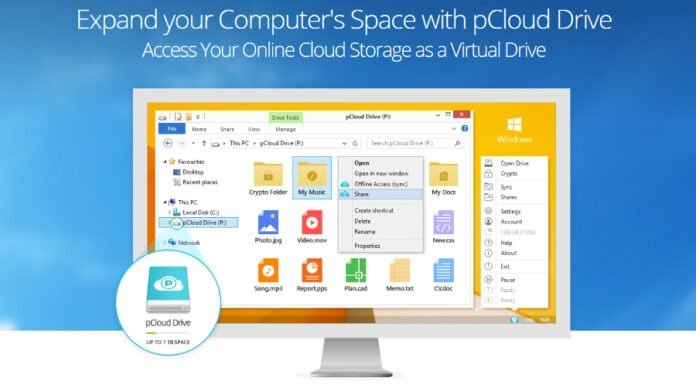Table of Contents
Best cloud storage of 2021 online
For many businesses, online cloud storage solutions has come to replace traditional on-premise storage hardware. Instead of storing files and folders on a single server, cloud storage distributes data across someone else’s infrastructure (data center, server, hard drive etc.)
Ever since Amazon popularized storage online with S3 (Simple Storage Service), 13 years ago, Google data shows that interest for “Cloud Storage” alone has increased by 40x.
Given the multitude of cloud storage providers out there, one has to wisely choose a provider who will offer the maximum amount of low-cost storage and bandwidth, while still keeping your data safe.
This list represents our top picks for cloud storage: most offer a free tier allowing you to see if they’re right for you before handing over any hard-earned cash. And it’s iDrive that leads the way thanks to how fast, thorough and easy to use it is.
We’ve also featured:
- Best cloud backup
- Best cloud document storage
- Best cloud storage management services
- Best cloud storage for pictures and images
Business users will need to consider carefully what their needs are as terms and conditions as well as quality of service is likely to differ significantly from their consumer alter ego.
Go straight to your desired option through the jump links below:
- Best free cloud storage
- Best business cloud storage
- Best cloud backup
Best online storage of 2020 at a glance:
- iDrive
- pCloud
- Zoolz
- Degoo
- Mega
- OneDrive
- iCloud
- Google Drive
- NextCloud
- SpiderOak
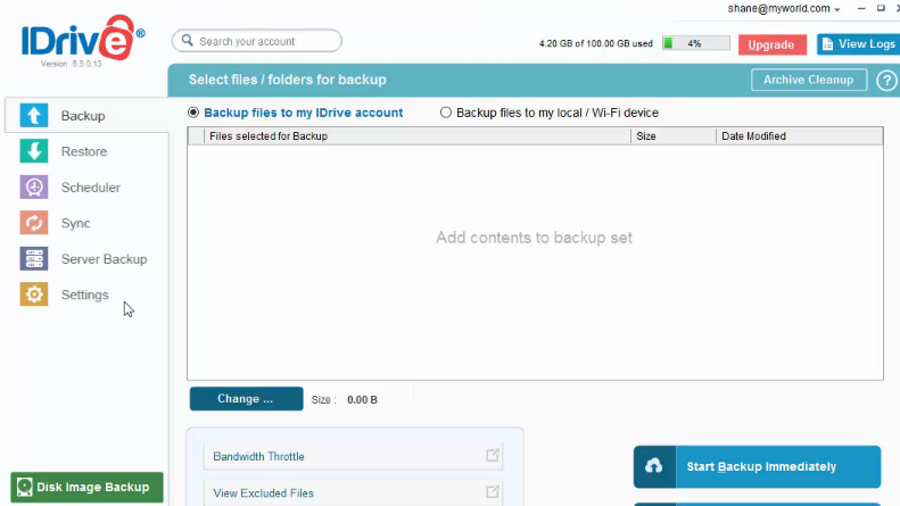
IDrive offers continuous syncing of your files, even those on network drives. The web interface supports sharing files by email, Facebook and Twitter. Cautious or click-happy users will be pleased to hear that files deleted from your computer are not automatically deleted from the server, so there’s less danger of removing something important by accident. Up to 30 previous versions of all files backed to your account are retained.

Another thing to note is that IT admins have access to IDrive Thin Client application, which allows them to backup/restore, manage settings, and more for all their connected computers via a centralized dashboard.
For photos, you have a neat facial recognition feature that helps you to automatically organize them as well as syncing them across all your linked devices. IDrive also offers IDrive Express which sends you a physical hard disk drive if you lose all your data, allowing for the swift restoration of all your backed up files. That applies to the newly introduced disk image backup feature.
A business version exists and offers priority support, single sign-on as well as unlimited users and server backup. Furthermore, IDrive Cloud, an enterprise-class cloud object storage is also available.
While some bandwidth limits apply, there seems to be no limit to the size of files you can upload, so feel free to sync large media files with pCloud. The service is available for all desktop and mobile platforms – users can also log in via the website. The company itself is registered in Switzerland which has strong privacy laws and you can also pay a premium of $4.99 a month for pCloud Crypto to lock (and unlock) individual files with passwords.
Note that it is one of the very few cloud services that offer lifetime subscriptions. The latter come with 30 days trash history and unlimited remote upload traffic (you only need the URL of the file); you are – as expected – limited on the download link traffic: 500GB for the Premium package and 2TB for the Premium Plus package.
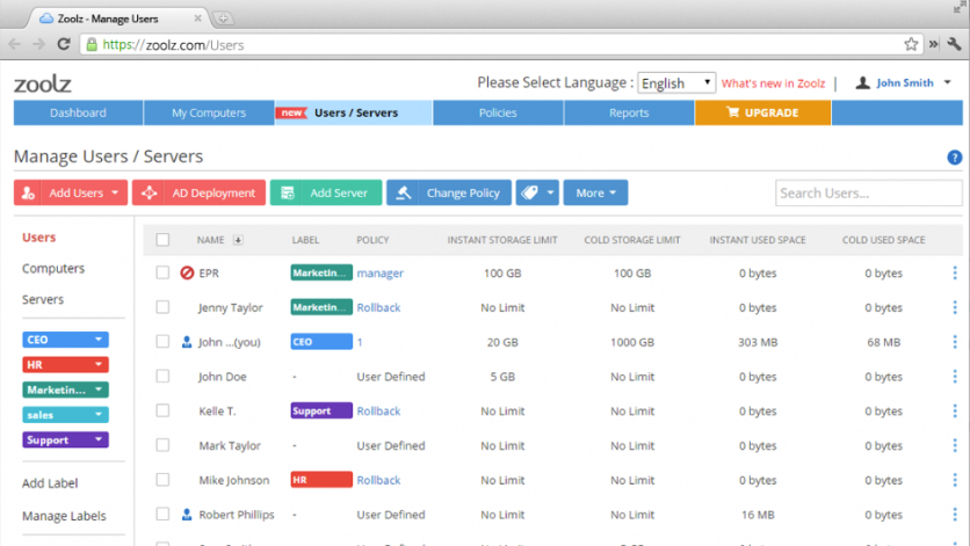
There are lots of things to like about Zoolz Cloud Backup for both personal use and business deployment. It offers an easy to follow interface with excellent web management options, and the ability to combine cloud operations with local external storage.
This UK-based company leverages Amazon’s Glacier infrastructure to deliver a compelling price/performance ratio, with prices far cheaper than the competition. With 20PB of data stored for three million users for more than a decade, Zoolz is also not as ephemeral as some of its rivals.
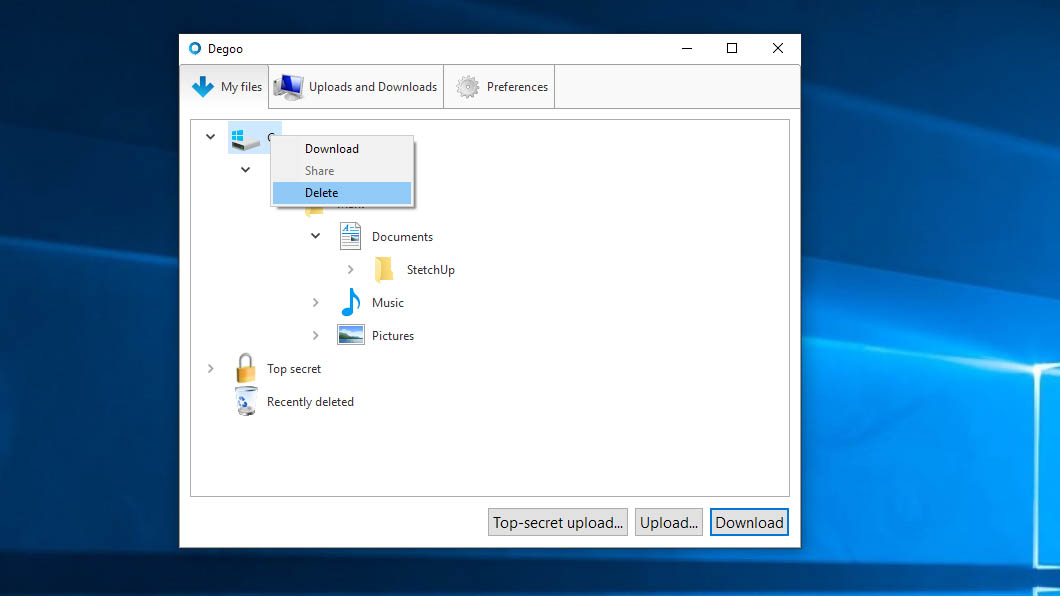
Swedish outfit Degoo is not a household name, and therefore it comes as a surprise that it has managed to carve itself a niche inside the ultra-competitive cloud storage market.
With only two offerings, this outfit has managed to attract more than 15 million users globally since its inception earlier in 2019 – an estimated 20,000 people join Degoo every day. It is one of the few cloud storage companies worldwide that encrypts stored files and disperses them across four different continents. It also supports two-factor authentication via the Google sign-in.

With an insanely generous free tier and a simple drag-and-drop interface, New Zealand-based Mega is one of the cloud storage heavyweights. There’s a handy mobile app to allow you to upload files and photos, as well as sync clients with desktop machines. The company also has business tailored plans.
Mega claims that all data stored in its cloud is encrypted on your device before it reaches the firm’s servers. As the company has released the source code to its sync client, experts can check that there are no vulnerabilities.
Price: 50GB free. 400GB for $6 a month (£4.50, €4.99, around AU$7.50). 2TB for $12 a month (£9, €9.99, around AU$16). 8TB for $23 a month (£17, €19.99, around AU$30). 16TB for $35 a month (£26, €29.99, around AU$46).
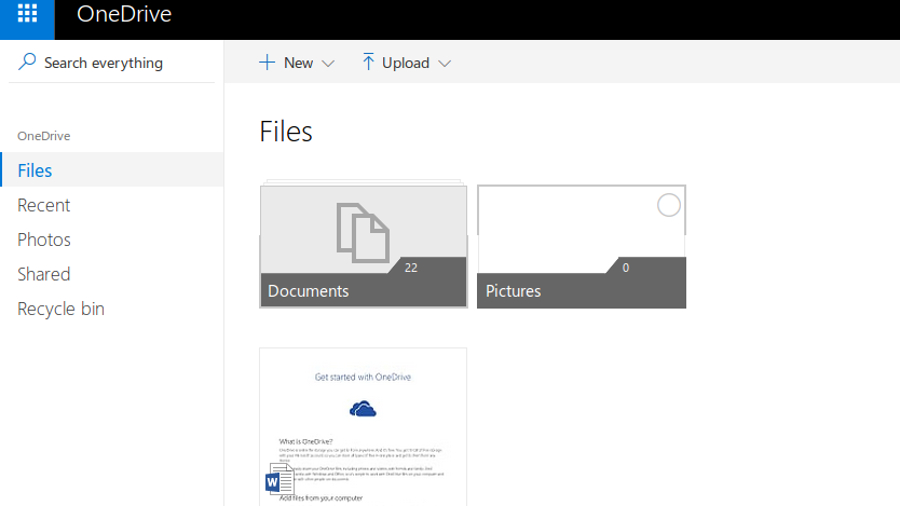
OneDrive is integrated into Windows 10’s File Explorer. You don’t have to download an additional app – it’s there to use out of the box, which is obviously very convenient for those who have made the jump to Microsoft’s newest operating system.
Microsoft’s Photos app can also use OneDrive to sync pictures across all your devices. As of late March, Autodesk AutoCAD has been integrated with OneDrive which is good news for anyone using the software’s drafting tools. In addition, you have a feature called Personal Vault, which gives you an added layer of protection. There’s an app for Android and iOS devices, and there’s even one in the App Store for Mac users (although it has received mixed reviews).
Price: 5GB free. 100GB for $1.99 a month (£1.50, around AU$2.9). 1TB for $7 a month (£5.99, around AU$11). Unlimited (as part of Onedrive for Business) for $10 a month (£7.99, around AU$14)
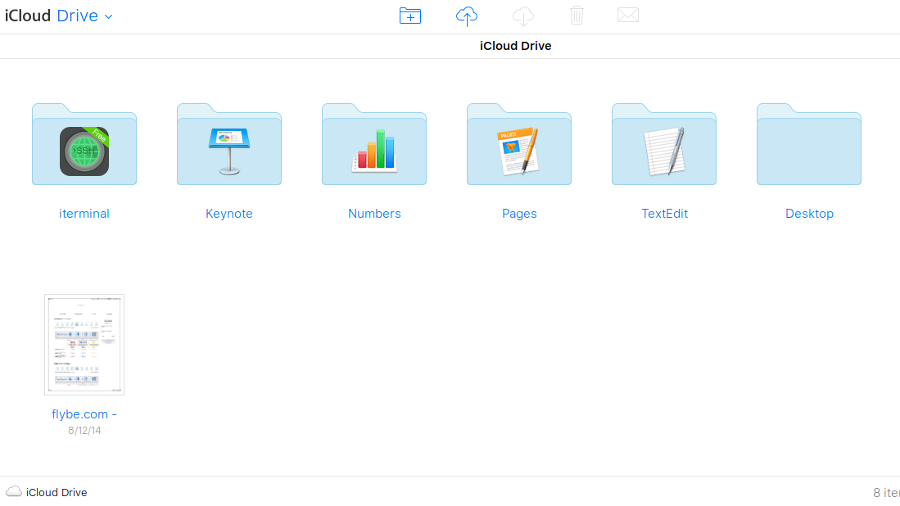
If you want to back up your iPhone to iCloud, you’ll need more than the free 5GB allowance Apple gives you, but compared to rivals iCloud prices are very reasonable.
The Mac Finder app integrates iCloud Drive, where you can store any files you wish. Documents created in the iWork office suite are also saved to iCloud and can sync across your devices. Windows users can also sync their files with iCloud Drive using the official client, and access the iWork apps on the iCloud website.
Price: 5GB free. 50GB for $0.99 a month (£0.79, AU$1.49). 200GB for $2.99 (£2.24, AU$4). 2TB for $9.99 (£8, AU$13)
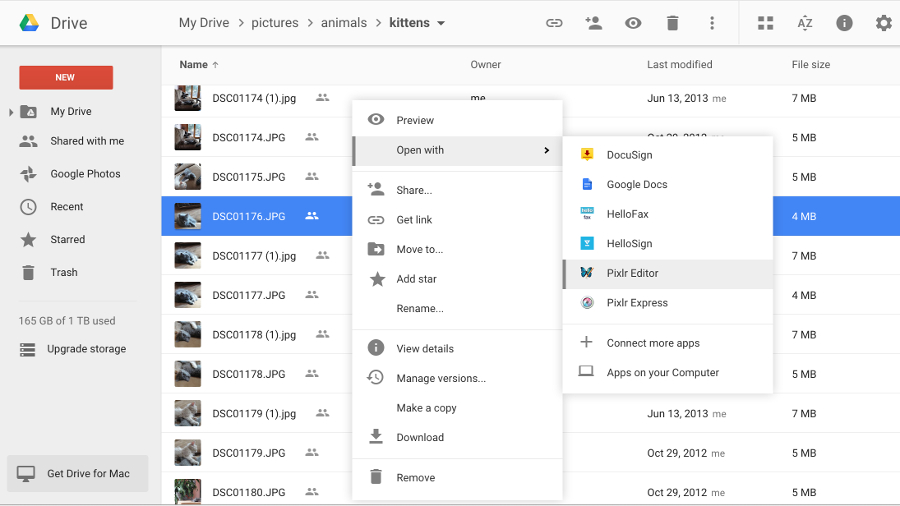
Google Drive is a natural choice for owners of Android devices as it’s already integrated, but users of other platforms may appreciate the generous free storage too. You can also store high definition photos on your mobile phone with companion app Google Photos, and make use of Google’s own office suite (now known as G Suite). Also, upgrading to paid Google Drive plans is now called Google One (although it might not yet be available, depending on the region).
Downsides include the fact that the web interface isn’t very easy-to-use, although Windows and Mac users can download a desktop app to drag-and-drop files easily.
Price: 15GB free. 100GB for $1.99 a month (£1.59, around AU$2.50). 200GB for $2.99 a month (£2.35, around AU$4.10). 2TB for $9.99 a month (£8, around AU$13). 10TB for $99.99 a month (£74, around AU$130). 20TB for $199.99 a month (£148, around AU$260). 30TB for $299.99 a month (£236, around AU$426).
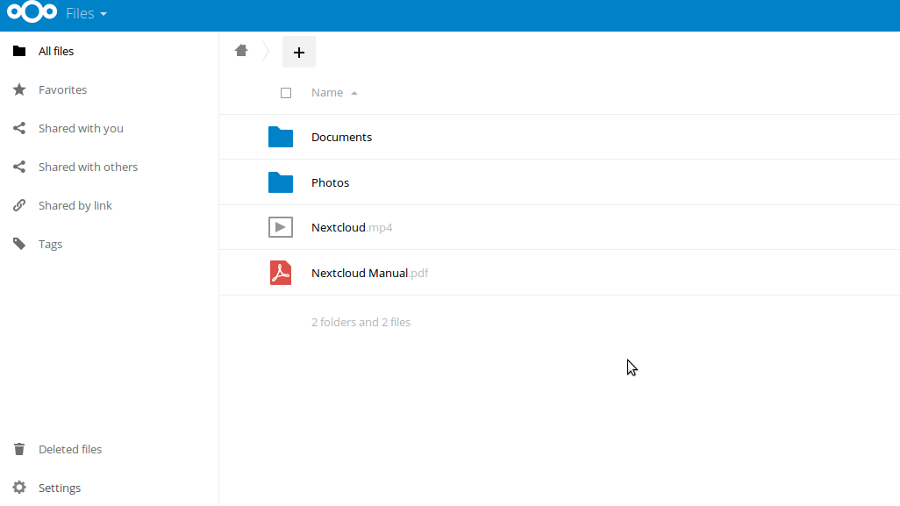
NextCloud isn’t an online cloud storage provider itself, but offers free software to download and install a cloud storage service on your own server. Using a server on your home network for cloud storage is much faster. You can also enable encryption and make sure the information never leaves your home network, which is far safer.
If you’ve no server or IT experience, you can even purchase a preconfigured NextCloud Box (if you can find one) which comes with a 1TB hard drive and will work with an inexpensive Raspberry Pi board to keep your data synced. Unfortunately, NextCloud Box is sold out but you can check out the alternatives on their website
Price: Free to install and use. Self-hosting so storage costs vary.
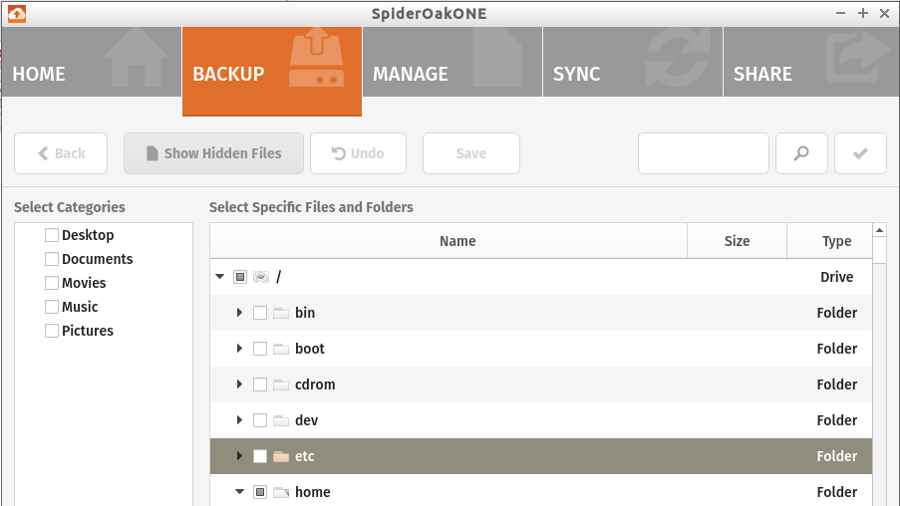
SpiderOak is part of a new trend of zero knowledge cloud storage providers. The website claims that after installing the client your data is encrypted before syncing. Unfortunately since SpiderOak hasn’t made the client source code public, there’s no way to confirm this.
The SpiderOakOne client is available for Windows, Mac and Linux as well as Android and iOS (although, both Android and iOS are read-only apps, meaning you can only view files, and can’t upload or sync anything). You can also log in via the web interface but privacy lovers may prefer not to as it exposes your password to SpiderOak employees.
Price: 21-day free trial. 150GB for $6 a month (around £4.5, AU$8.25). 400GB for $11 a month (around £8.4, AU$15). 2TB for $14 a month (around £10.7, AU$19.25). 5TB for $29 a month (around £22.1, AU$39.9)

Best free cloud storage
- Google Drive
- OneDrive
- pCloud
- Dropbox
- MediaFire
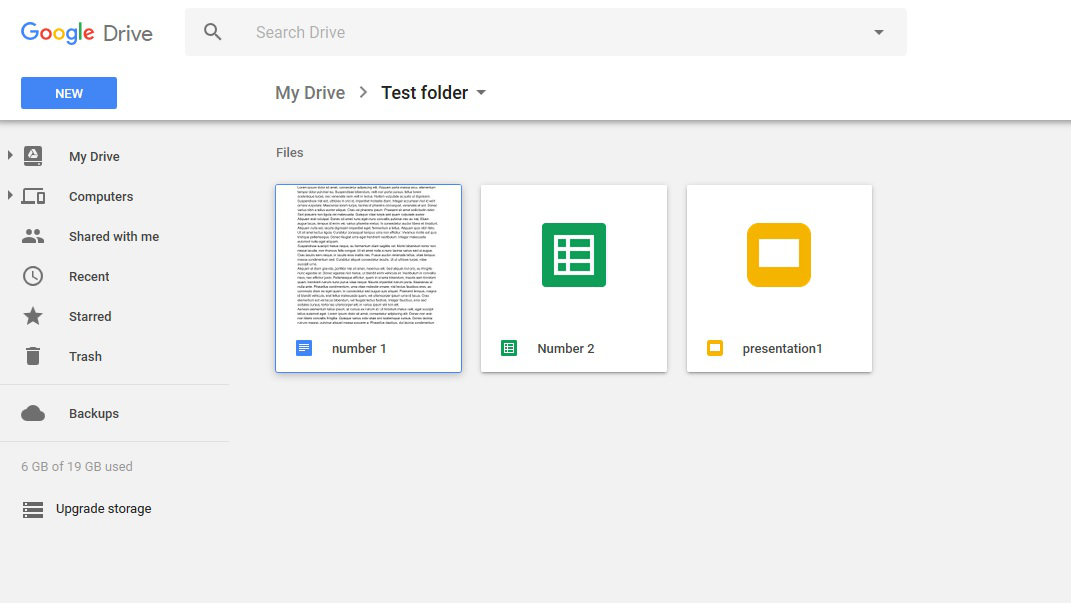
Free storage allowance: 15GB (expandable)
If you’re a Google user, you already benefit from Google Drive integration, such as the ability to save email attachments from Gmail. However, anyone can sign up for the free cloud storage, even if they don’t have a Gmail address, by creating a new Google account. Google is also in a process of releasing Google One as a sort of substitution for Google Drive, although depending on your region it might not be available yet.
With 15GB of space for new users, Google Drive is one of the more generous cloud offerings, and there are occasional ways to boost this capacity free of charge. The catch is that this Google storage space is also shared with a user’s other Google services including Gmail and Google Photos.
Mobile apps are available to allow easy access for iOS and Android users, and Google’s Backup and Sync desktop app lets you synchronize files from your PC to the cloud. Google Drive also includes online office tools for word processing, spreadsheets and presentations which can makes sharing files with others effortless.
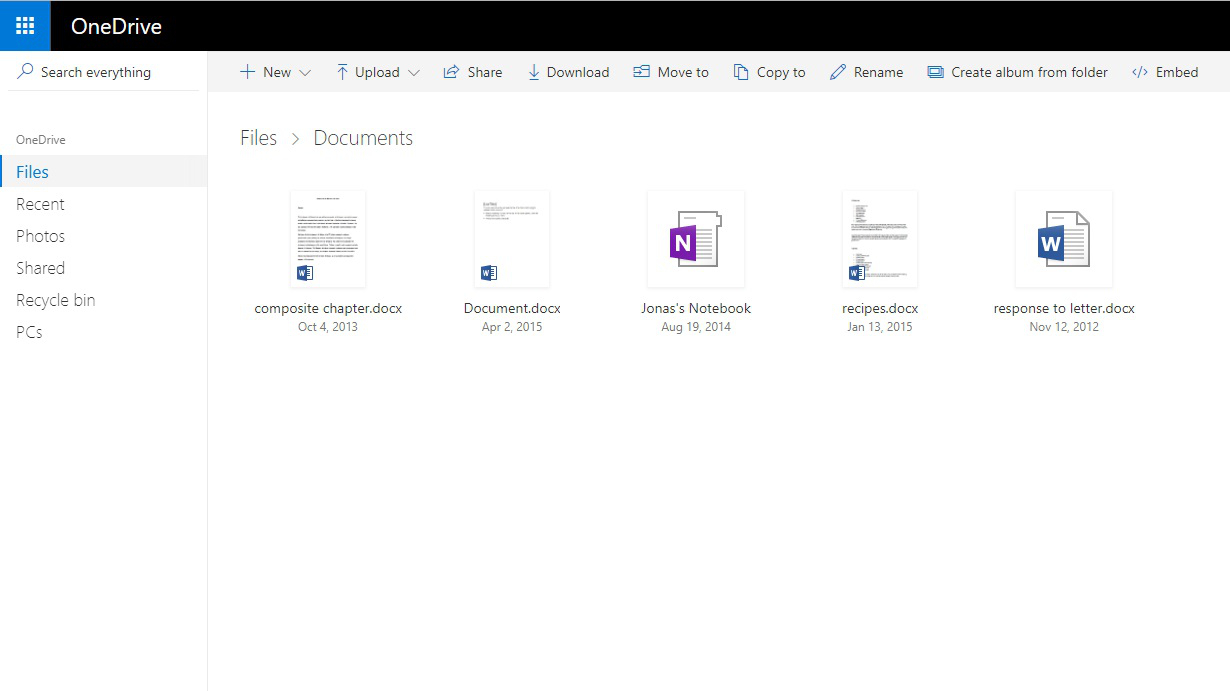
Like Google Drive’s appeal to Google users, OneDrive will be a good fit for anyone who is committed to using Microsoft’s services. There’s neat integration with Outlook.com, for instance. It’s also integrated with non-Microsoft services like AutoCAD. OneDrive also ties in nicely with Windows 10, and there is a selection of reasonable mobile apps to facilitate access on the move.
It’s possible to share files with other people even if they aren’t OneDrive users (complete with customizable permissions), and the ability to edit files online without downloading them is a welcome touch.
Free storage allowance: 5GB
Coming from Microsoft – a company with plenty of money to throw at the cloud – it’s a little disappointing to find that OneDrive doesn’t include more space free of charge. Free users get a mere 5GB of storage, although it’s relatively inexpensive to increase this to 50GB.
If you have Office 365, you’ll automatically get boosted to 1TB of space, but not everyone wants an Office subscription.
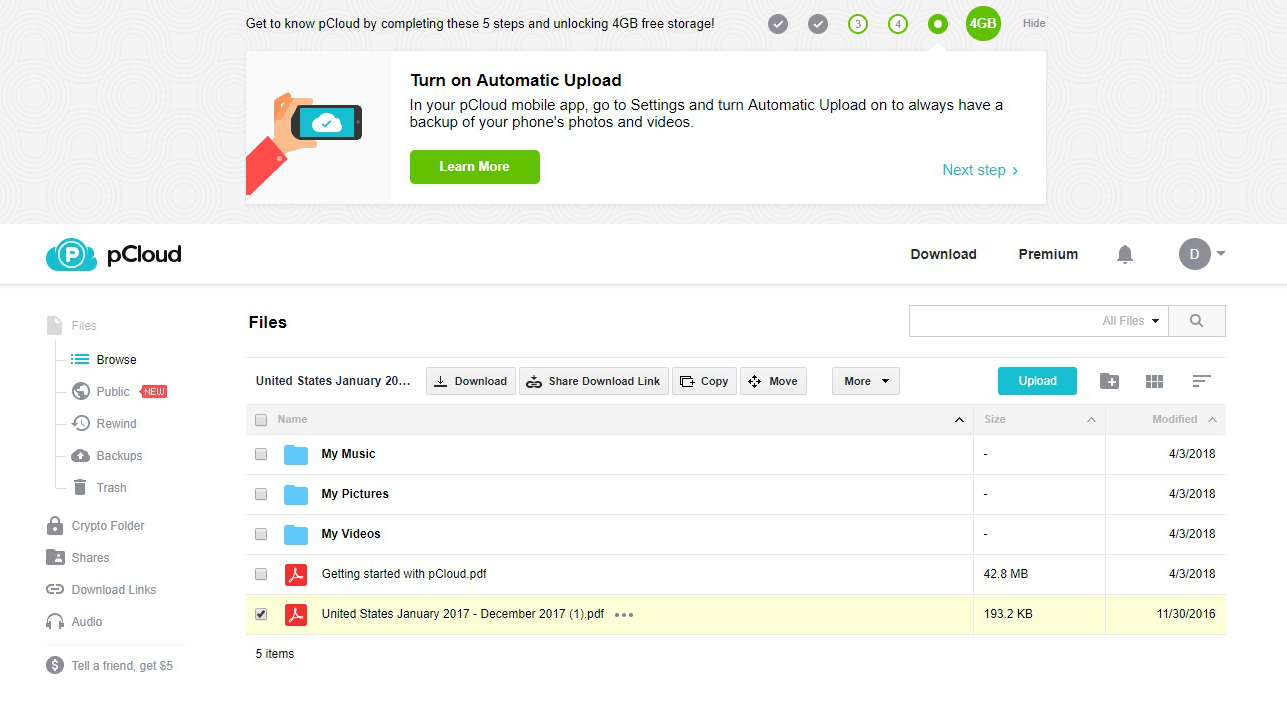
Free storage allowance: 10GB (expandable)
You might not recognize the name, but if you’re looking for a decent chunk of cloud storage free of charge, pCloud could be just the ticket. To kick things off, you’re given a fairly generous 10GB to play with, and there’s a bandwidth allowance of 50GB of downlink traffic per month.
While we’re primarily interested in the free version of pCloud, note that you can upgrade to 500GB of space for a monthly plan of $4.99 (£3.70), or 2TB for $9.99 (£7.50) a month – both of which are great deals for storage. You also have annual and lifetime plans, which are a cheaper option in the long run.
The initial 10GB free offering can also be expanded up to 20GB via an additional 4GB for completion of offers, as well as referrals that add 1GB each. It’s also worth noting that pCloud offers well-designed desktop and mobile apps that supplement the website for seamless integration into a user’s workflow.
With no limit on file sizes, and simple sharing options, pCloud is a great way to send large files to friends and colleagues – it’s even possible to share with people who aren’t using the service themselves. Add in decent streaming options and a neat online interface, and pCloud is well worth a look.
- The best free alternatives to Microsoft Office
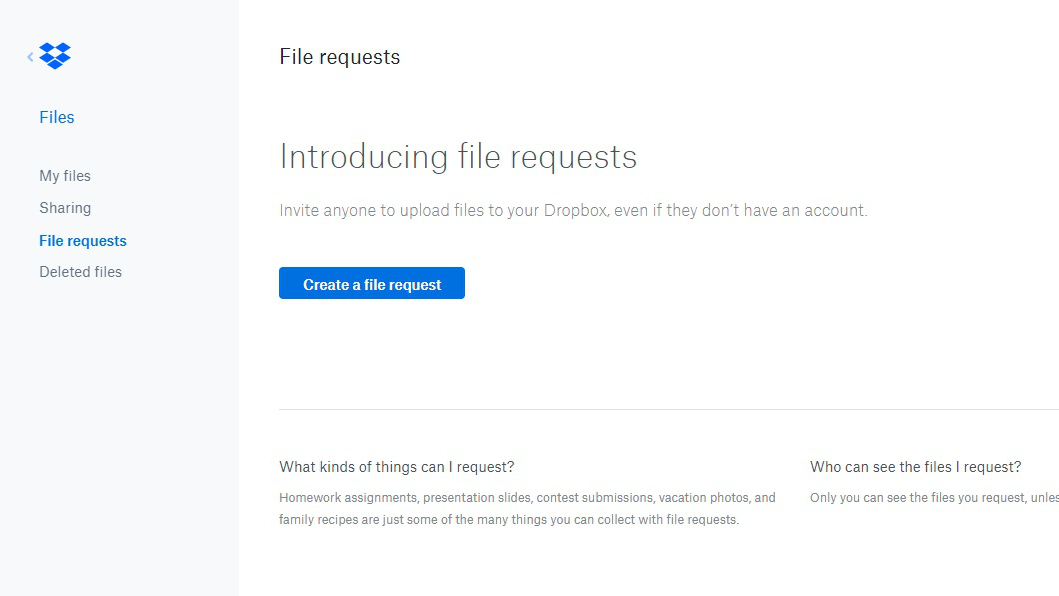
Free storage allowance: 2GB (expandable)
Dropbox is a stalwart of the free cloud storage world, with a web interface that remains streamlined and easy-to-use.
Despite its popularity, Dropbox actually has one of the least generous free packages for new users (just 2GB), but there are various ways to boost this space without paying, including inviting friends to join (you get 500MB per referral up to 16GB), completing the Getting Started guide (250MB) and contributing to the Dropbox forum (which elicits 1GB per ‘Mighty Answer‘ provided).
DropBox really comes into its own when you start delving into the service’s extra features. There’s a great collaborative working tool called Dropbox Paper that acts as a group workspace, and – if you install the desktop app – you can back up photos automatically. The File Requests feature also allows you to request another user to upload a file to your Dropbox account. Additionally, a feature called Dropbox Rewind lets you restore folders or your entire account to a specific point in time.
There are desktop apps for Windows, Mac and Linux, and mobile apps including Android, iOS and even Kindle. This gives Dropbox broad appeal, as does the support for third-party apps and services.
The web version of Dropbox lets you edit files without needing to download them, and really the only thing that counts against the cloud storage service is that most alternatives offer more space to free users.
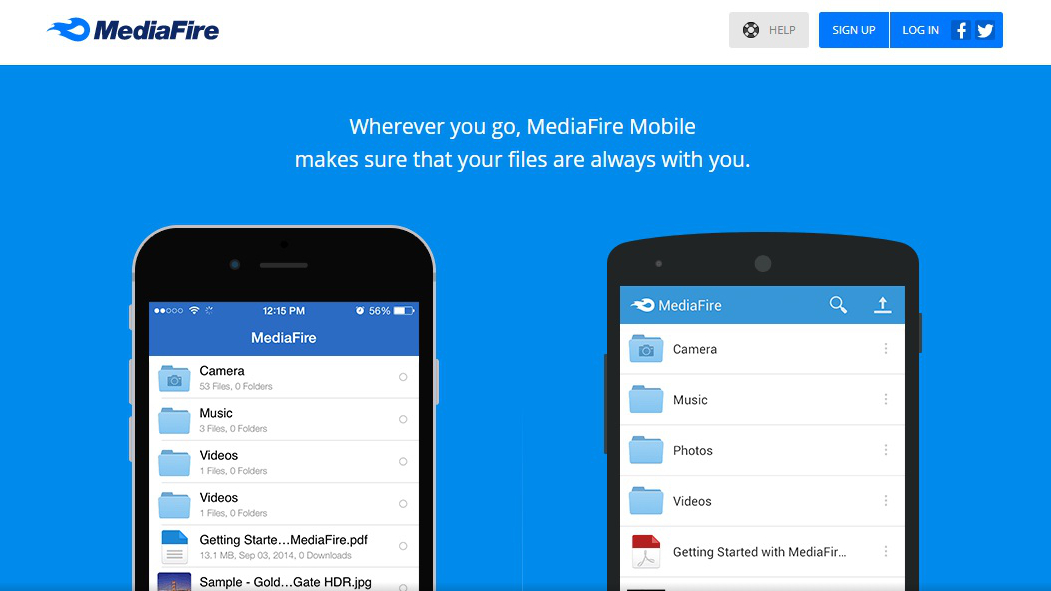
Free storage allowance: 10GB (expandable)
MediaFire has been around for over a decade, and those years of experience really show. You’re given 10GB of free space initially, but you can boost this by an extra 40GB through activities like referring friends and following MediaFire’s social media accounts. Few people would disagree that 50GB of free cloud storage is impressive. Free accounts carry ads, but this is a small sacrifice to make.
There’s support for large files up to 20GB, and the sharing options are very impressive, even allowing sharing with non-users.
The web-based interface is excellent too, and MediaFire offers mobile apps for convenient uploading and downloading on iOS and Android. These make it easy to access files you’re storing in the cloud, and include convenient features such as automatic photo syncing.

Best business cloud storage
- SpiderOak
- Tresorit
- Egnyte
- Dropbox Business
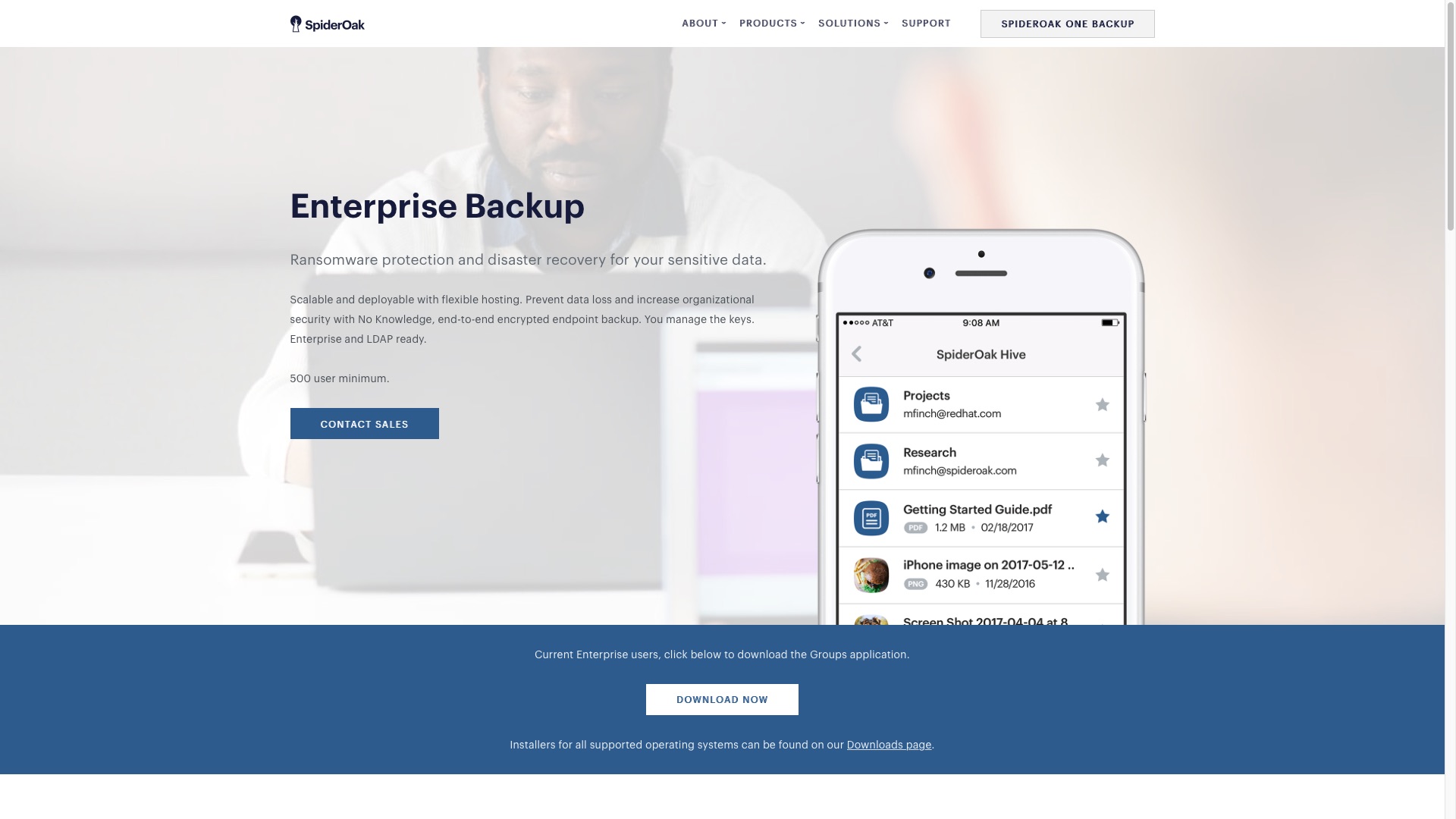
SpiderOak is a collaboration tool, online backup and file hosting service founded in 2007. The platform allows users to access, synchronize and share data using a cloud-based server.
The company places a strong emphasis on data security and privacy. They offer a cloud storage, online backup and sharing service which they claim uses a ‘zero knowledge’ privacy environment. This means the client is the only one who can view all stored data. Not even SpiderOak themselves have access to your data.
SpiderOak’s main focus is on privacy and security. As a result, the tool itself has a very basic design. This makes the admin console and all central device management very straightforward to use. They also include a handy drag and drop feature for organising files.
From the centralized device management dashboard, users can access settings for all applications such as backup selection and sharing. The dashboard also allows users to manage their accounts, set group permissions and gain insight into usage.
Prospective business clients will need to contact SpiderOak’s Sales Team directly to obtain a quote. 500 users minimum is required.
Online commentators have observed that SpiderOak lacks many of the collaboration tools available from other cloud storage providers.
- You can sign up for SpiderOak here

Tresorit is a cloud storage provider based in Hungary and Switzerland. It was founded in 2011. The provider emphasizes enhanced security and data encryption for businesses and personal users alike.
If you are concerned with ensuring that your stored data is kept safe online then Tresorit is the service for you. This provider allows you to keep control of your files through ‘zero-knowledge encryption’ meaning that only you and the chosen few you decide to share with can ever see your data. Your Tresorit account can also be secured by two-factor authentication login and you can choose where to keep company data with Data Residency Options. Furthermore, you also have features like Document Scanner which securely scans and uploads documents directly to Tresorit.
Tresorit’s ‘Small Business’ Packages starts at $25 (£19.60) per month (or $20 monthly for the annual plan) for teams with 2-9 users. This includes 1000GB encrypted storage, secure access on up to 10 devices and synching of existing folder structure.
Tresorit’s ‘Business’ plan begins at $30 (£23.30) per month (or $24 monthly for the annual plan) for businesses with over 10 users. This comes with extras such as digital rights management, remote wipe and phone support. At the time of writing there is a 50% discount on “Business plan”, so you can pay as low as $12 (£9.4) per month
For Enterprise solutions, users will need to contact Tresorit directly. Extras included in this are personalized staff training, admin API and on-premises deployment.
All tiers come with a 14-day free trial.
The extra security offered by Tresorit makes it relatively expensive compared to other cloud backup solutions. However, most users will probably appreciate the greater piece of mind and extra features offered by Tresorit.
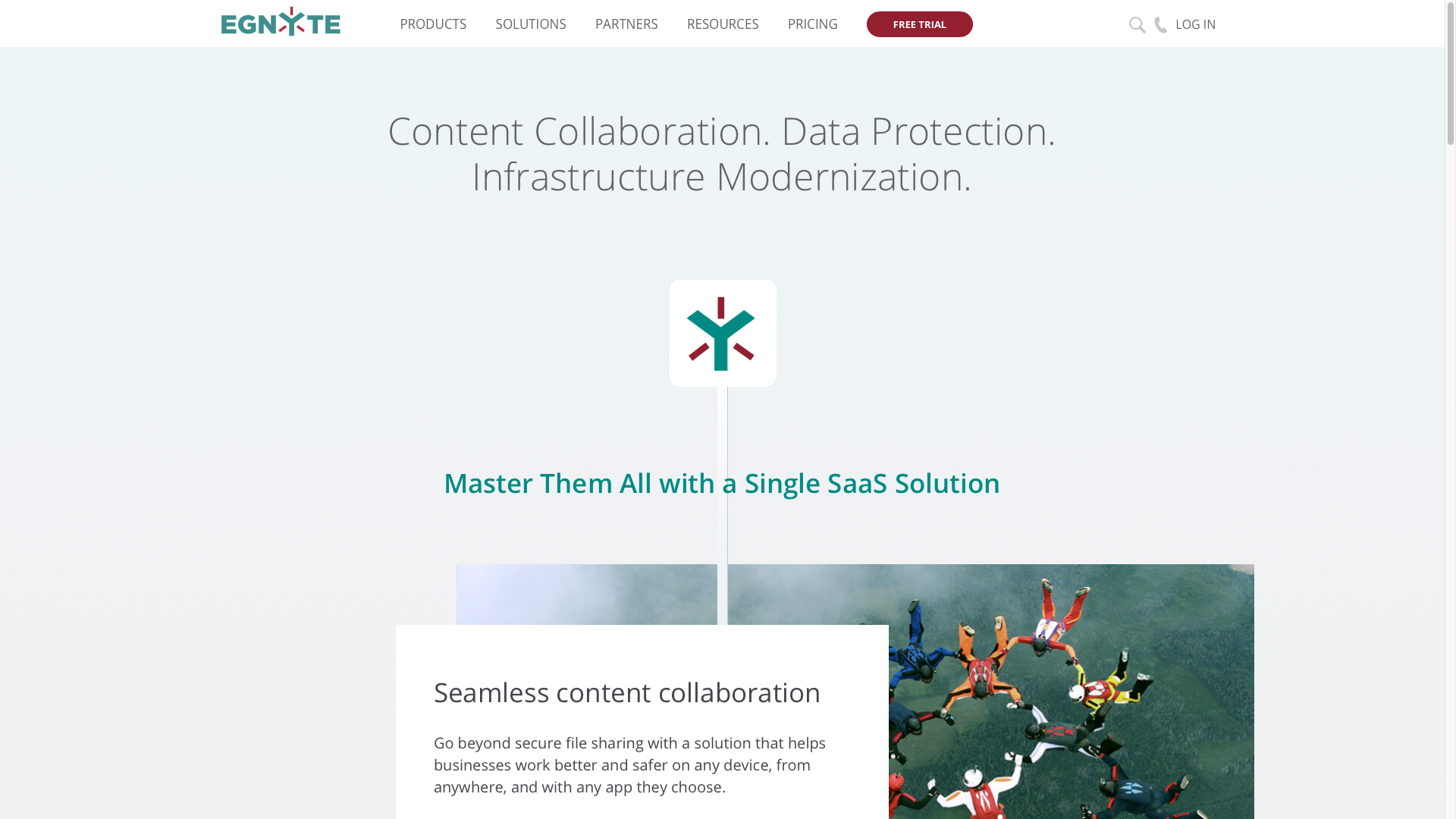
Egnyte was founded in 2007. The company provides software for enterprise file synchronization and sharing.
Egnyte allows businesses to store their data locally and online. All types of data can be stored in the cloud, whilst data of a more sensitive nature can be stored on servers on-premise. This makes for better security.
Business teams can work how and where they want with an easy to use collaboration system through Egnyte’s content services platform.
Egnyte integrates with popular industry applications such as Office 365 or Gmail. This allows both remote and internal employees to access all files with ease.
Egnyte’s ‘Office’ plan starts at $8 (£6.21) per employee per month. This covers 5-25 employees, 5TB of storage and 10GB max file size.
The ‘Business’ packages starts at $20 (£15.7) per employee per month. This includes 25-100 employees, 10TB online storage and 10GB max file size.
In order to take advantage of their ‘Enterprise tier’, which includes over 100 employees, 25GB max file size and unlimited storage, you will need to contact Egnyte directly.
Egnyte offer a 15-day free trial for all packages.
Users have observed that some files, such as photos, can take a long time to load.
- You can sign up for Egnyte here
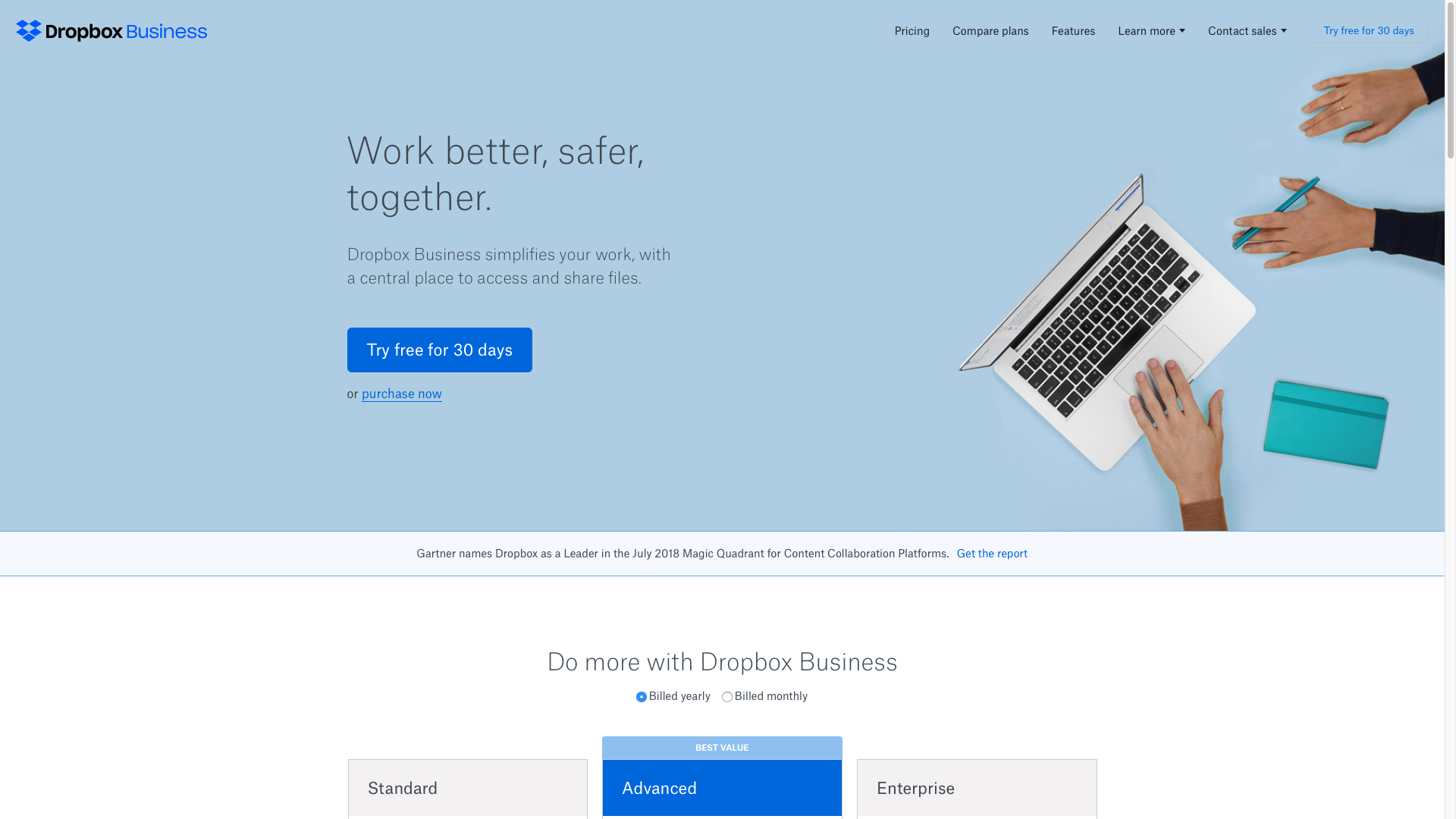
Dropbox is one of the oldest cloud storage providers. It was founded in 2007.
To date it is one of the simplest storage providers to use. Dropbox can be installed on most computers or devices and syncs easily between apps. The app can store almost any kind of file while never having any issues with compatibility. You can drag and drop files into the desktop app with ease.
You can also share files with other users easily through links. These can be shared with users who don’t have a Dropbox account. Also, teams can make use out of Dropbox spaces, which transforms folders into collaborative workspaces. Furthermore, with Dropbox Transfer you can send up to 100 GB of files in just a few clicks.
As Dropbox has been around for a long time it integrates with most other apps such as MS Office and Slack.
All files and folders can be shared with other users even if they are not part of your account. These users will be limited to their own plan’s storage limits.
Dropbox Business can be connected to your personal account so you can access all your files in once place. Personal account feature “automatic camera upload” is now also available to Business accounts, as of November 2018.
The dashboard is simple and easy to use. From here, admins can see how many team members they have as well as any pending invites. You can restrict sharing, and allow/block commenting as you see fit. The dashboard allows you to access settings and to monitor usage.
Dropbox offers a 30-day free trial which asks for your payment details. Your plan will automatically upgrade after the trial at which point your card is charged.
The ‘Standard’ plan starts at $12.50 (£9.71) per user per month starting at 3 users and includes 3TB storage.
The ‘Advanced’ package begins at $20 (£15.70) per user per month with unlimited storage.
In order to subscribe to the ‘Enterprise’ tier, users will need to contact Dropbox directly.
Some users have commented on the lack of online editing tools.
- You can sign up for Dropbox Business here
- Stay safer online with a Virtual Private Network – discover the best VPN.

